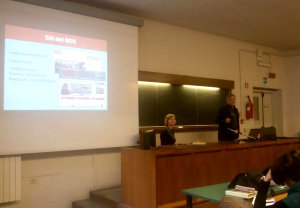On November 18, the Political Science Department of the University of Perugia hosted a debate on the movement for boycott, divestment and sanctions (BDS) against Israel. Scheduled to speak were Stephanie Westbrook (BDS Italy), in favor, and Giorgio Gomel (JCall Italy), opposed.
During the introduction, Prof. Federico Zanettin, organizer of the debate (at the request of Political Science students of the association Un ponte per...), announced that Giorgio Gomel, just days prior, had declined to participate due to concerns that the event might appear as a unilateral initiative of the BDS movement. Despite the absence of Gomel, the event took place, with broad and active participation.
An overview of the BDS campaign, both internationally and in Italy, was presented, emphasizing the broad consensus it has gained within large mainstream organizations such as trade unions and churches, and, following the recent attacks on Gaza, support of the President of Bolivia Evo Morales and Hollywood stars such as Danny Glover. The work on college campuses in the United States, where resolutions for divestment from Israel have been multiplying, was also highlighted.
The debate was also an opportunity to respond to JCall’s position against the BDS movement. For example, while JCall argues that the BDS campaign has no impact on Israel or its economy, the facts presented during the debate show the exact opposite. Companies such as G4S and Veolia, targets of BDS campaigns due to their role in Israel’s prison system and settlements, have suffered significant financial losses and reputational damage and have announced the withdrawal from certain activities in Israel and Palestine. Sodastream, whose shares have fallen by 50% over the last year following a much publicized BDS campaign, recently announced the closure of its factory in an Israeli settlement. In addition, major banks and pension funds in Europe have divested from Israel in recent years. However, the clearest indication of the effectiveness of the BDS movement is perhaps found in a January 2014 statement by the Israeli Minister of Finance: "We have formulated complete scenarios as to what will happen if the boycott continues... In all scenarios, things do not look good."
JCall also states that the BDS campaign, in particular academic and cultural boycotts, weaken Israeli artists and intellectuals who, according JCall, are often the greatest defenders of Palestinian rights. While the latter statement has yet to be demonstrated, the guidelines by the Palestinian Campaign for the Academic and Cultural Boycott of Israel (PACBI) clearly show that there are no constraints on the activities of Israeli artists and intellectuals who want to engage publicly in favor Palestinian rights. Indeed, the call for BDS contains an explicit invitation to conscientious Israelis to be part of it, and to reject funds offered by Israeli institutions that aim to transform them into "ambassadors" of government policies.
Finally, JCall believes the BDS movement reflects an "unhealthy obsession" with Israel, as the subject of exclusive attention. Those present were reminded that the BDS campaign was launched by 170 organizations of Palestinian civil society against Israel for the simple fact that it is Israeli policies that deny the rights of the Palestinian people. This criticism seems, therefore, more of an invitation not to deal with Israel and its violations of human rights and international law than anything else.
The initiative was an important opportunity to discuss the reasons behind the BDS campaign, and its results, in an Italian university setting. Hopefully, similar events will multiply, opening up the debate on this nonviolent tool based on respect for international law, aimed at arriving at a solution in which rights for all, and not just a part, are guaranteed.
BDS Italy

